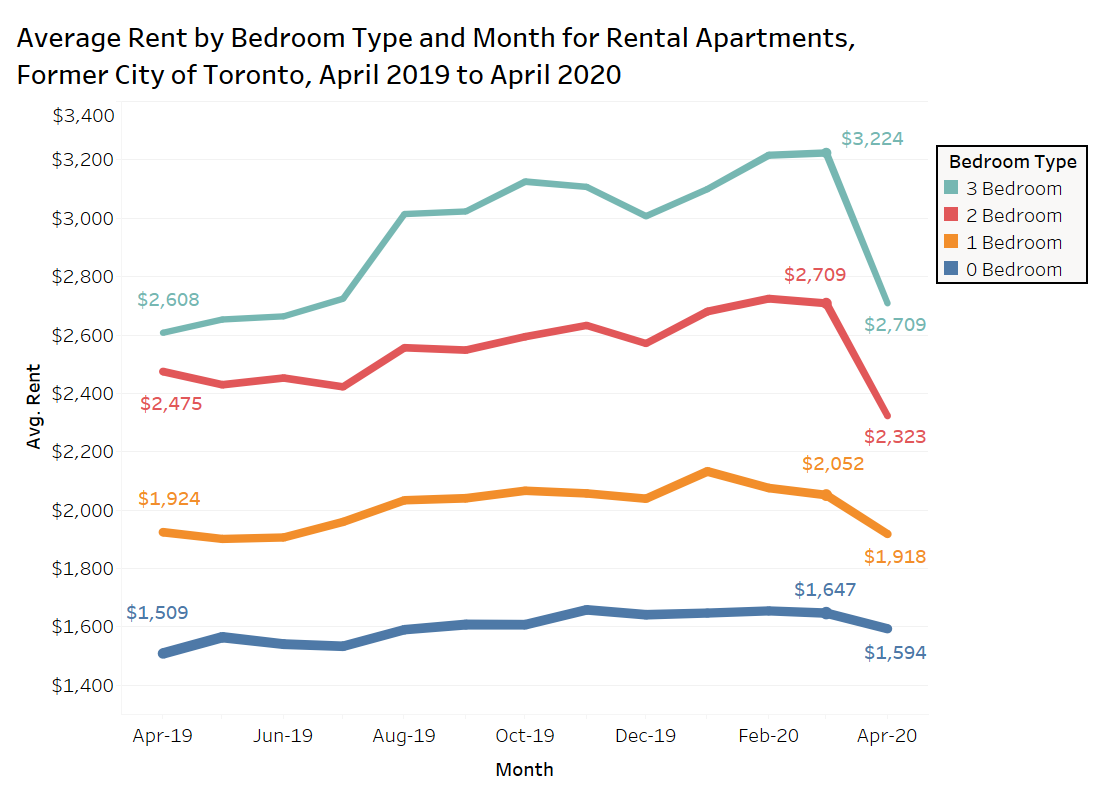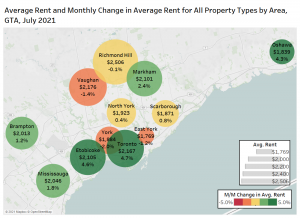The COVID-19 pandemic has started to negatively impact asking rents in the Greater Toronto Area (GTA) as outlined in the Rentals.ca May National Rent Report. In this report using TorontoRenals.com data which shares listings with its sister website Rentals.ca, we take a closer look at the GTA market and the pockets of rental activity.
The chart below shows that the average rental rate for all property types in the GTA declined by 2.7% monthly to $2,180 per month. The average monthly asking rent in the GTA peaked at $2,328 in August of 2019, but was still up 1.3% annually in April of this year.
The rent per-square-foot is based on a smaller sample size of available properties where the owner or landlord includes the unit size in the listing. In April, rent per-square-foot was down 1.2% monthly, but is still up 5.0% annually.
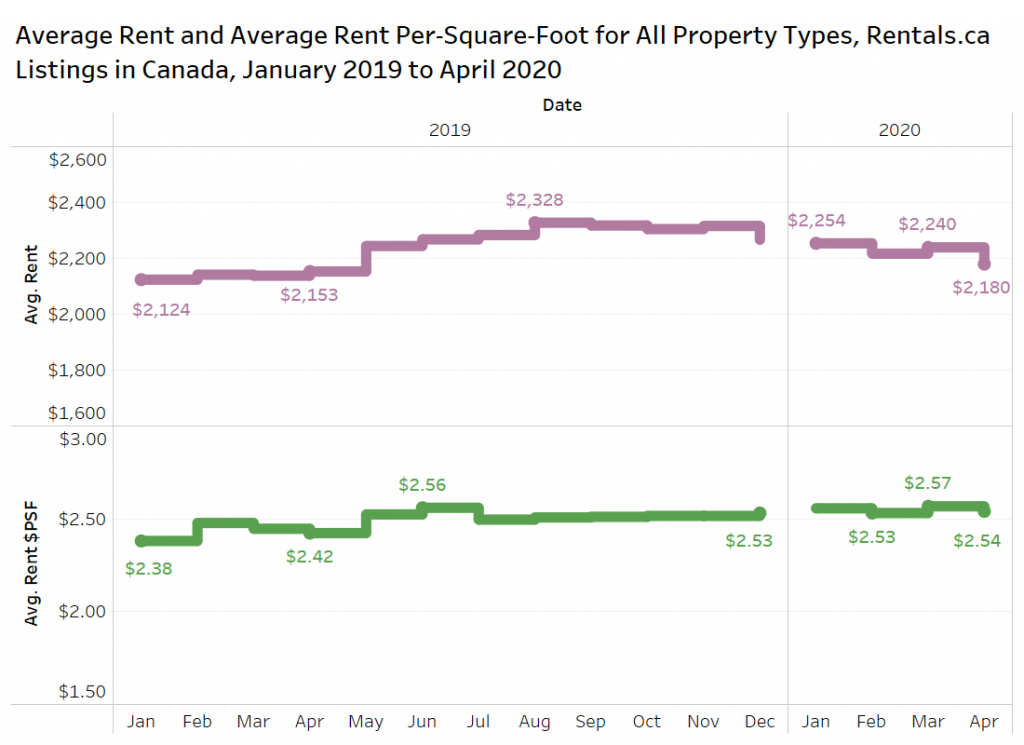
Average Rental Rates by Area
The chart below looks at the average rent for all property types by municipality and former municipality in the GTA over the past 13 months.
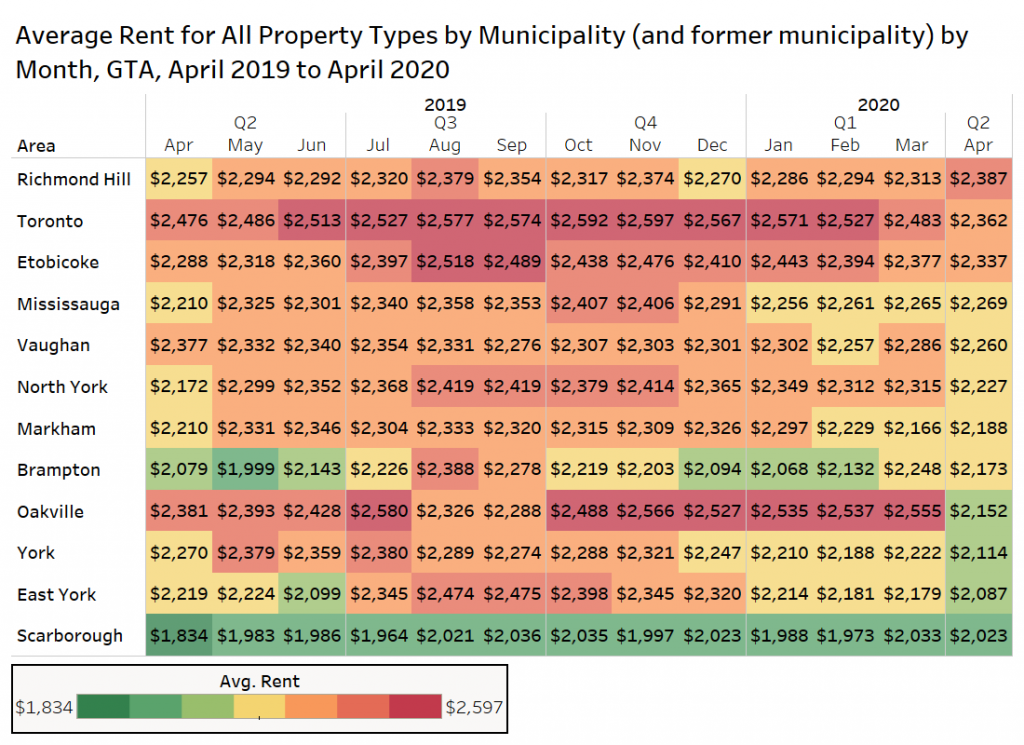
Richmond Hill had the highest rent in April at $2,387 per month, followed by the former City of Toronto (pre-amalgamation boundaries) at $2,362 per month, and the former City of Etobicoke at $2,337 per month. Richmond Hill has the highest rent because of more large single-family homes offered for rent that pull the average up, and fewer small, older, and worn-down rental apartments that pull the average down.
Among the top municipalities, Scarborough had the lowest average rent at $2,023 per month.
Rents in Richmond Hill increased month-over-month in April, climbing 3% monthly from March 2020 and 6% annually from April of 2019. Markham was up 1% monthly, but down 1% annually. Scarborough declined by less than 1% monthly in April, but has grown the most year-over-year among these major municipalities (and former municipalities) at 10%.
Toronto rents declined 5% both monthly and annually in April. Part of the decline can be attributed to an increase in former short-term rentals hitting the market, which added a major infusion of supply in a market weakened by the pandemic and the economic and health uncertainties around moving.
The 16% monthly drop in Oakville has more to do with the change in the composition of listings. A drop that severe denotes some landlords are simply pulling their listing from the market at this time.
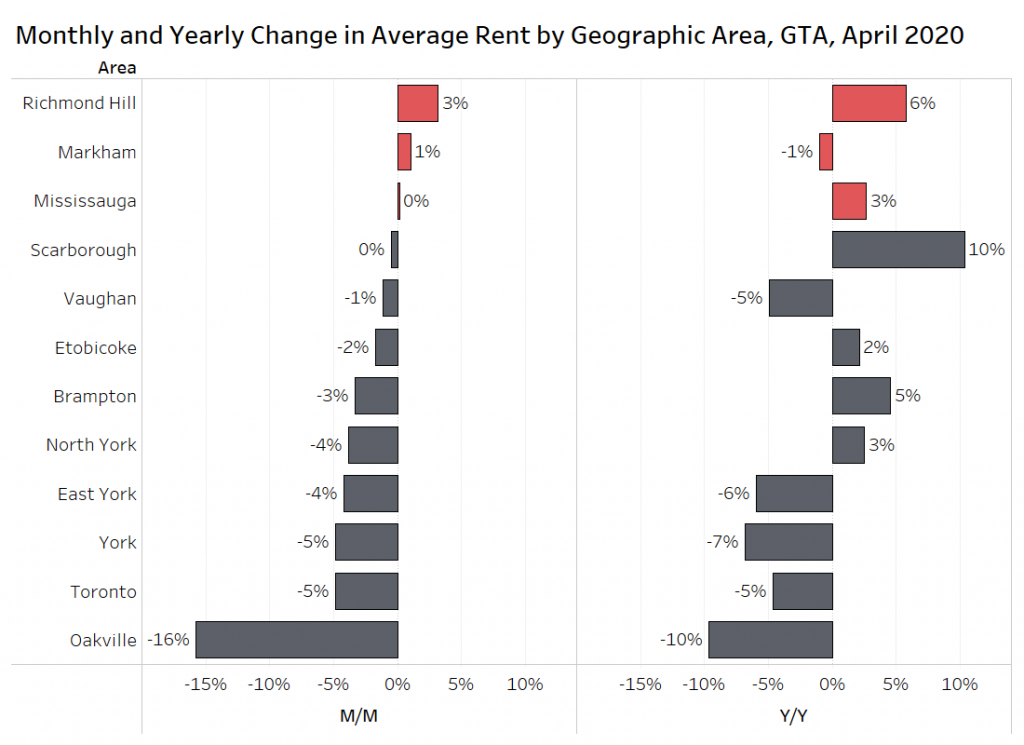
Rental Rates for Furnished and Unfurnished Units
There has been much discussion regarding the short-term rental market, as tourism in the GTA has all but stopped, and employment that attracts shorter-term contract work has been put on hold. The suites were also being rented to host parties and events, and those are not happening either.
Much of that short-term rental supply is furnished, and the chart below looks at the rental rate per-square-foot for furnished and unfurnished condominium apartments in North York, Etobicoke and Toronto.
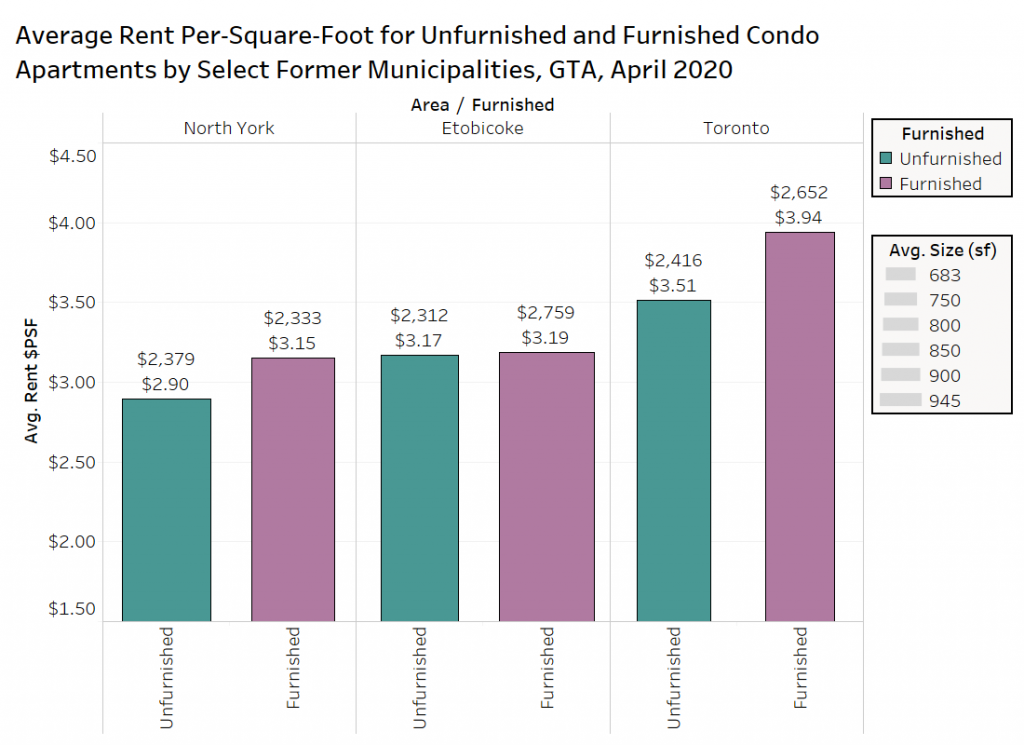
In old Toronto where there is the largest supply of furnished units, the average unfurnished condominium apartment was offered at $2,416 per month or $3.51 per square foot (psf), compared to $2,652 and $3.94 for a furnished unit. Monthly rent is 10% higher for furnished condos on average, with the per-square-foot rental rate 12.3% higher on average in Toronto.
Median Rental Rates by Property Type in Toronto
The majority of the listings in the former City of Toronto are either condominium apartments or rental apartments, and both experienced significant declines from March, with condos dropping 4.2% month-over-month and rental apartments dropping a whopping 11.2% monthly.
The smaller sample size of single-family (singles and semis), and townhouse properties both increased month-over-month, which likely had more to do with more large units being unrented and pulling the average up, as opposed to an increase in demand. It should be noted that the median rent for single-family listings in April 2020 was lower than April 2019 ($3,200 vs $3,350).
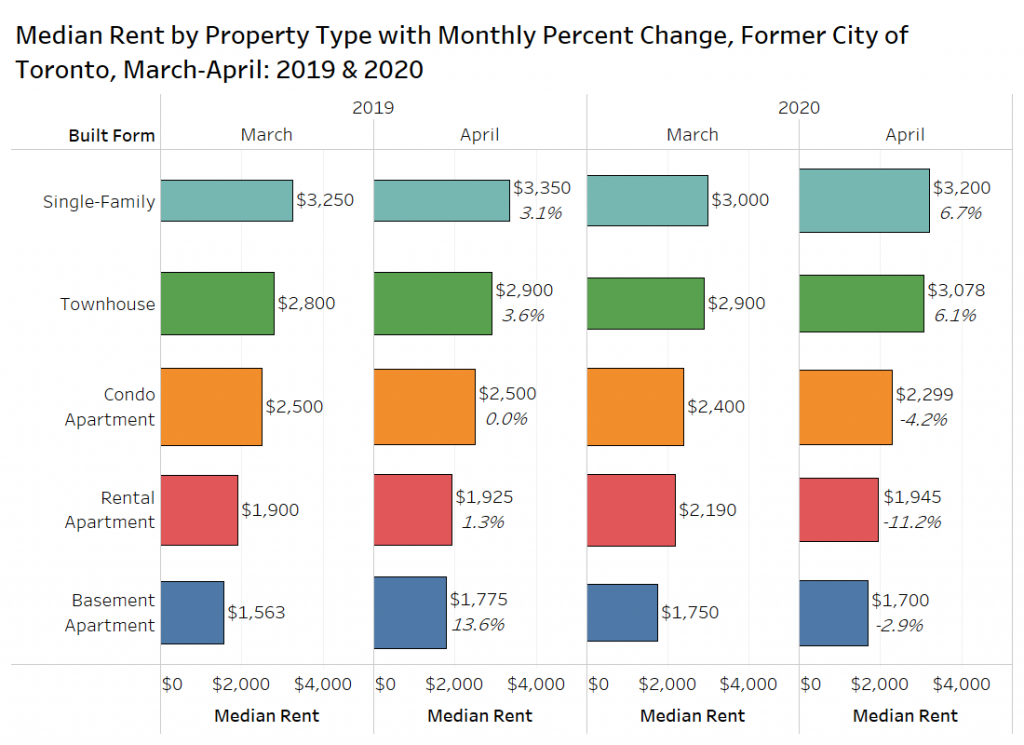
The median condominium apartment in April was listed at $2,299 per month, down by over 8% from April 2019 ($2,500). The median rental apartment in April 2020 was up by $20 per month over April 2019.
Average Rental Rates for Rental Apartments by Bedroom Type in the former City of Toronto
The largest declines in average monthly asking rents for rental apartments in the former City of Toronto were three-bedroom suites, which declined by 16% month over month (Avg $PSF rent: -19%), but remains above the average rental rate from April 2019. Two-bedroom apartments experienced a monthly decline of 14% (Avg $PSF: -19%), and are now down 6% from one year ago.
One-bedroom suites declined by 7% monthly and studios dropped by 3% from March. One-bedrooms are now down annually, while studios are still up 6% year-over-year.
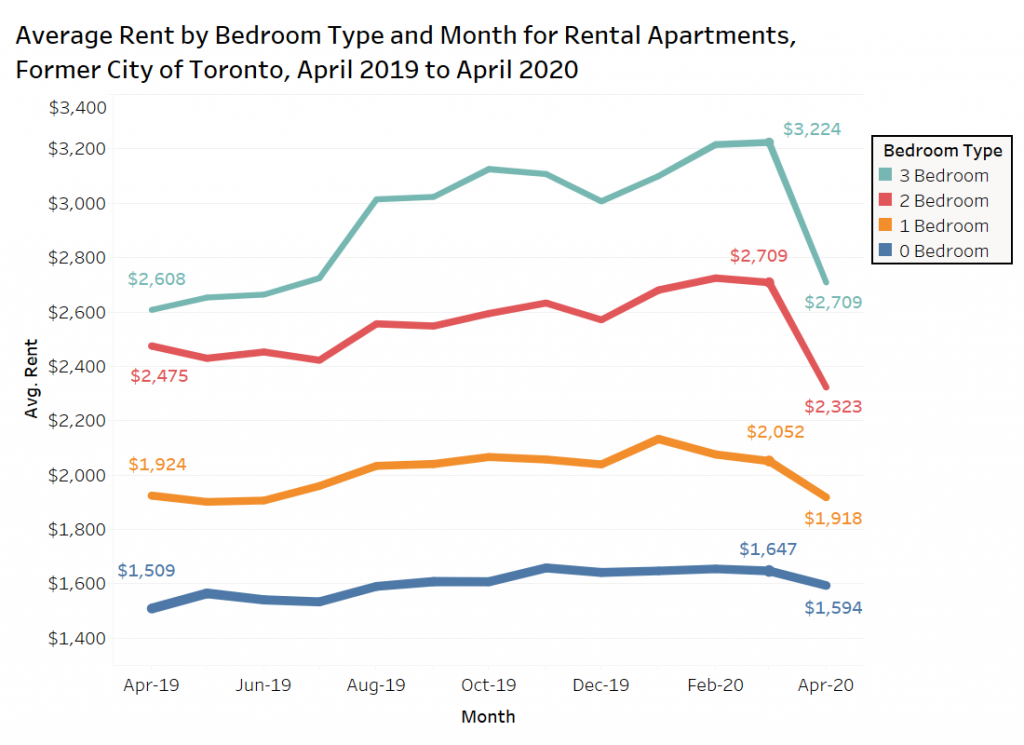
Change in Monthly Rent at Downtown Projects
Rental demand has plummeted in Toronto as tenants stay in their current accommodations for fear of exposing themselves to COVID-19 and unemployment soars with the pandemic lockdown, reducing move up, move-down movement, as well as the creation of new households from recent graduates, students and immigrants.
Many landlords have tried to entice tenants to make a move in this uncertain time by lowering their asking rent. The map below looks at projects with 10 or more listings in April, presenting the monthly change in average rent from March to April.
Some major developments experienced noteworthy declines including Three Hundred on Front Street and Massey Tower on Yonge Street at -13% monthly, as well as Smart House Condos on Queen Street at -11%, and 87 Peter at -7%.
Due to the changing composition of units for lease, several projects experienced increases month over month (could occur with more units for lease on upper floors, units with large balconies, upgraded interior finishes, parking, corner units, etc).
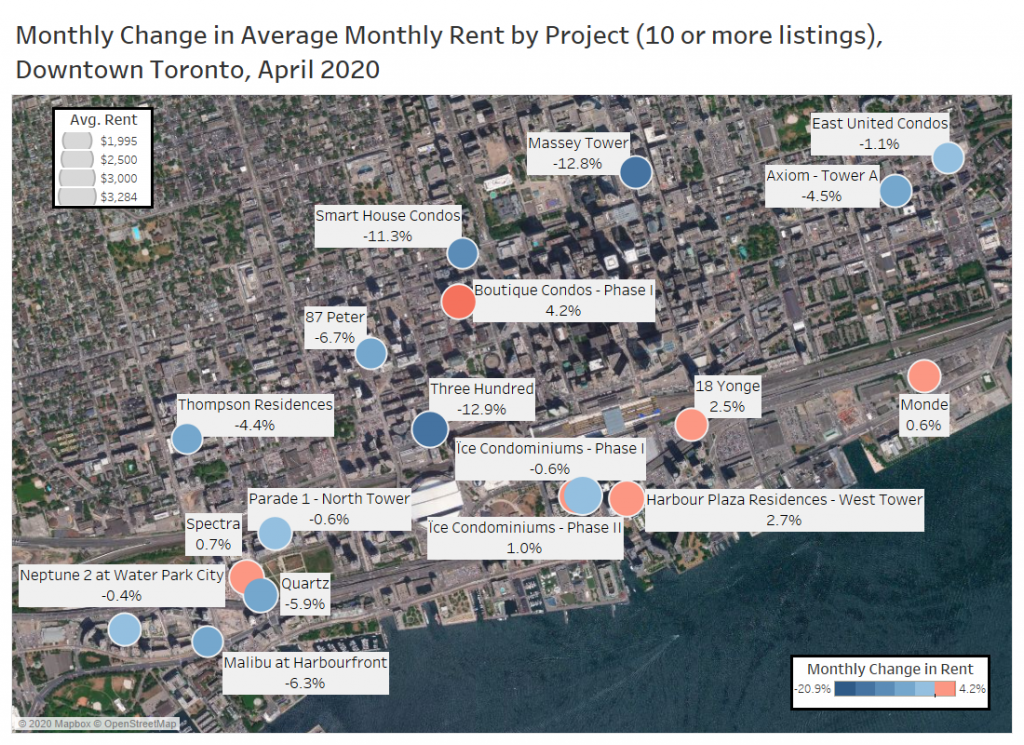
Summary Data on Condo Rental Activity in the GTA
With condo rental rates declining at many projects in the GTA, there has been discussion as to whether it is still a good investment to purchase pre-construction units and rent them out (see commentary in this Toronto Star Story).
The following table includes the average rental rate in 2019 and 2020 via TorontoRentals.com for 30 listings over 24 buildings in the GTA. The table shows the annual change (2019 overall vs year-to-date 2020) for the same unit size, the average purchase price based on pricing for that unit size taken from new home listing marketplace Buzzbuzzhome, the estimated loan payment (20% down payment, 3.5% interest rate, 25-year amortization), the total payment (includes estimates for property tax, condo fee, and insurance), and the average monthly cash flow.
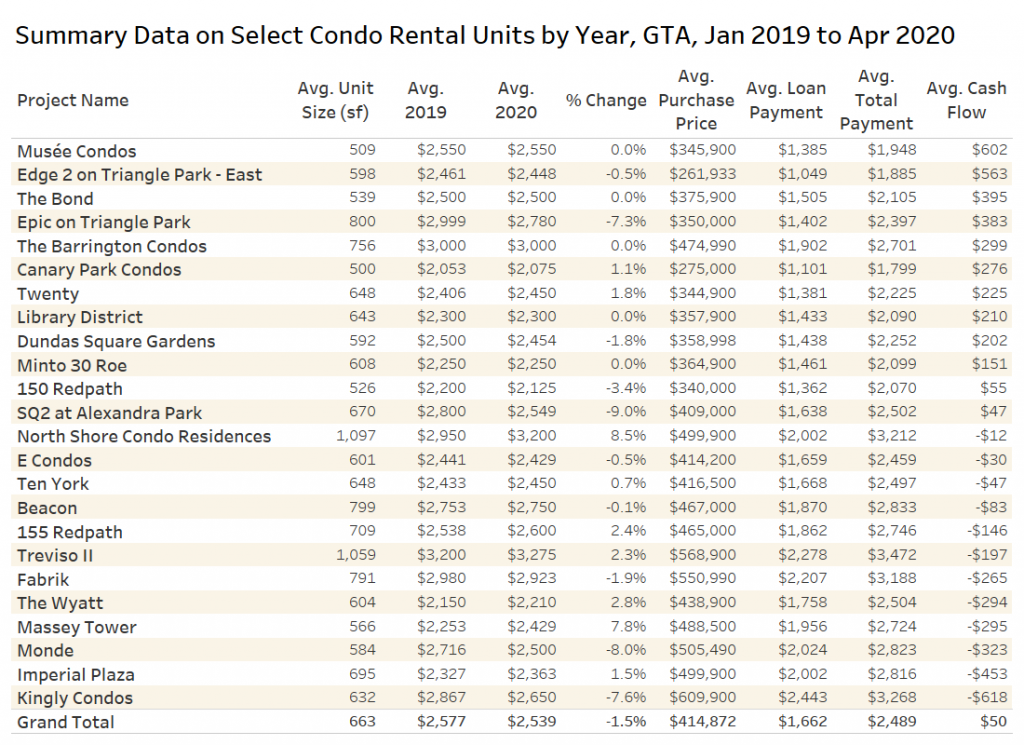
In 2013, Musee Condos was launched for sale, the 509-square-foot (sf) 1C unit was last offered for sale at $345,900 or $680 psf per pricing on Buzzbuzzhome. That unit was available for rent in 2020 for $2,550 per month per TorontoRentals.com data, with an estimated carrying cost of just under $1,950 per month, for a positive cash flow of over $600 per month (excludes property management fee, upkeep, and vacancy allowance. The analysis doesn’t take into consideration the fact that the investors may have paid extra for parking and/or lockers).
In 2010, Edge 2 at Triangle Park launched for pre-construction sales. The building was completed in 2014, and in 2020, three units were pulled from the TorontoRentals.com listings data that showed an average rent of approximately $2,450 per month. Those units come with a carrying cost of just over $1,885 per month, which results in monthly cash flow of approximately $565 per month.
On the opposite side is Kingly Condos’ 632-sf unit having a negative monthly cash flow of $618. This is a perfect example of why investors should be cautious when purchasing in developments with short closings. The project was initially scheduled to be a mixed-use office and rental development when construction started in 2016, but the residential portion was converted to condominium tenure when rent control was expanded as part of the Fair Housing Plan announcement in spring 2017. The project launched in November 2017 with the last price available for the 632-sf unit at $609,900. The project started occupancy less than 1.5 years after the launch, and in 2019 the average rent for the 632-sf unit was $2,867 per month, while that same unit size was offered at $2,650 per month (not necessarily the exact same unit, the suite was available on floors 7 to 13). The total payment estimated for this unit is estimated to be $3,270 per month.
Investors have to think long term, as the 509-sf unit at Musee is delivering over $7,000 per year in income to the owner, but investors must also consider the time between the pre-construction purchase and closing, as the farther out the completion date, the better chance that rental rates will have appreciated.
Conclusion
It is likely that many tenants were planning on moving pre-pandemic and their lease term was up in March, April or May, but have extended it short-term. However, we really have no idea how much pent-up tenant demand there is, and if those plans have changed with lost jobs, lost wages, and reduced opportunities for many workers in this depressed economy.
What impact will COVID-19 have on the long-term outlook for rental developers and investors? Will the missed payments and lower rents discourage the construction of new purpose-built rental apartments? Will investors shy away from pre-construction condo purchases? We’ll start to get the answers to those questions in the fall of 2020, as new high-rise condo projects launch, and sales absorption figures are announced. We’ll be able to monitor annual construction start activity in the spring of 2021. Will the surge in rental construction subside?
There are a lot of unanswered questions, which we’ll discuss on this blog in the coming months and years. Stay tuned.
